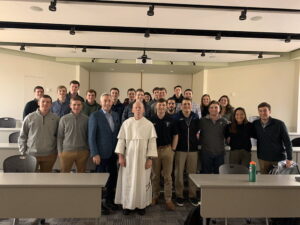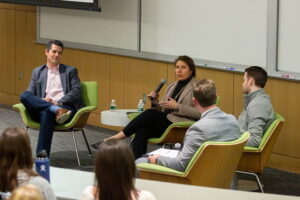Tag: SBO
Father Brian J. Shanley, O.P., Talks Big East
by The Cowl Editor on March 5, 2020
Friar Sports
Bob Driscoll Joins in for Riveting Presentation
by Liam Tormey ’22
Sports Staff
Last Thursday, the Sports Business Organization at Providence College got the opportunity to hear Rev. Brian J. Shanley, O.P. and Athletic Director Bob Driscoll discuss the history of the Big East Conference and the influence that both men had on its formation.
To begin, both guests gave an overview of the roles that they have in sports at PC. Driscoll has been the athletic director at PC for 19 years and says his job is to “create the vision of what a first-class Division I department should look like.” He said that his role as athletic director would not be possible without the support of the president of the College, with that, of course being Fr. Shanley.

Fr. Shanley’s role at PC is far-reaching; however, and sports are a big part of his responsibilities. Fr. Shanley talked about the importance of “hiring smart people and letting them do their own thing.” He also spoke to the fact that he believes that if he needs to get into the “weeds” about someone, then that person is not doing their job. Although, he admits that has never found this to be the case at PC.
Next, Fr. Shanley and Driscoll were asked about both the history of the Big East and the realignment of the conference. The Big East originated in 1979. Fr. Shanley discussed the vision of Dave Gavitt, the former athletic director at PC at the time, and how he saw that northeast basketball was going to fall behind other major conferences unless something was done.
Indeed, in the early stages, many colleges wanted to join the Big East, and the conference had great success. However, the demise of the conference in past 10 years came as many of the big schools left to go to football conferences where all the revenue was.
Fr. Shanley spoke about the meeting at St. John’s University where all of the schools in the Big East got together to discuss how to fix this problem. At the meeting, it was decided that the Big East was going to “chart our own path individually of the football schools.”
A unique opportunity arose with the arrival of Fox Sports 1 and their need for a polished basketball product. The match between the conference and TV broadcaster ended up being perfect, as the Big East Conference received a 12-year contract with Fox which has “been a blessing,” according to Fr. Shanley.
Driscoll added that they were “in the right place at the right time” and “we went back to our roots” regarding the realignment of the Big East. The desire for schools to get into the Big East skyrocketed as presidents and athletic directors bombarded Fr. Shanley and Driscoll with calls to join the Big East.
Being able to play at Madison Square Garden for the Big East Tournament was also a huge boost for the conference. Both Shanley and Driscoll referred to it as “the Mecca,” saying the ability to have a long-term deal with MSG as the only conference in the country to play at the Garden was very important. Many major conferences still want to play at MSG, but the Big East is still the only conference able to do so, and that is huge from a marketing standpoint for the conference.
Fr. Shanley and Driscoll, were very excited to answer members’ questions about their role in forming the Big East Conference, and both believe the conference is in very good hands for years to come.
PC Alumni Shed Light on Careers
by The Cowl Editor on February 27, 2020
Professional Sports
AMA and SBO Bring Members of Sports Industry to Talk to Students
by Joseph Quirk ’23
Sports Staff
This past Wednesday, February 19 the Providence College American Marketing Association and the Providence College Sports Business Organization hosted a sports marketing panel featuring three PC alumni who have had remarkable success in the sports marketing field. The panel consisted of Matt Ryter ’07, an NFL Account Executive; Molly Giudice ’18, the New York Giants Suites and Premium Service Director; and Mike Hill ’07, the Mediahub Global Vice President and Group Director. The event ran for 45 minutes and began with an introduction of the panel, followed by a guided interview by a head speaker. Following the conclusion of the interview, the panel was opened to audience questions.
One of the first things the panel discussed was how they got to where they are right now. “Well, I’d say that everyone in this room is already very far ahead of where I was at this age,” joked Ryter. This was a common theme throughout the entire panel. All three guests stressed creating connections through networking and then aggressively following up with them.

Ryter talked about how he got his first job working for ESPN at a career fair in Gillette Stadium. After spending some time working for ESPN, Ryter used what he learned in a radio advertising class he took here at PC and took a media and advertising job with CBS. Networking led him to his NFL position today. His position entails many responsibilities, including negotiating sponsorship deals for the league.
Guidice met an executive for the Philadelphia 76ers on a trip and “badgered” him until she got an interview. She made calls for the 76ers and then used her experience working in ticketing to get an analytics internship with the Knicks and Rangers at Madison Square Garden. After realizing that was not for her, she took a job again with the Knicks and Rangers in ticketing. It was during this time she realized she wanted to work in service. She had options to do this with the Rangers and Giants, and she chose the Giants. Guidice has many responsibilities including managing premium partnerships, suites, and important events.
Hill works with clients who are purchasing sports sponsorships. He started by sending a ton of emails to different agencies, awhich is how he got an internship. He worked hard and was persistent and covered a wide area of internships. This allowed him to explore what he wanted to do and diversify his skillset and resume. He believes that this is very important. He got a marketing job right out of college, which he did not like, and this led to him bouncing around jobs before getting a low-level position in his agency and working his way up. He is working with Ryter now, as Ryter is trying to get Hill’s clients to sponsor the NFL.
The next segment was dedicated to any advice the alumni had for students trying to break into the sports marketing field. Hill followed his introduction with some good advice, saying, “Once you build up that foundation, you need to be persistent.” This was in reference to the competitiveness of the sports business field.
He continued: “Don’t be discouraged if it’s not working out because it is a competitive industry. If you are just persistent and network, you will find the job right for you.” He also mentioned the career fair, which is supported by his networking advice, as well as being informed on the responsibilities of these jobs, and being connected on platforms such as LinkedIn. Hill also wanted people to find what they want to do and understand what career path they want to follow.
“When you’re a freshman in college, you don’t really know what you want to do. You’re winding it down until you’re a senior,” he said. “When you’re first out of college, you’re a freshman in your career, you may not know what you want to do and that’s okay.”
These sentiments were echoed by the other two panelists. “Be the best at what you are doing now,” Guidice added. “If you want to get into sports, get your entry level job and be the best you can at it and the rest will fall into place.”
Hill advised students to keep an open mind, saying, “Don’t pigeon-hole yourself into one company or career path.”
The panelists provided more valuable advice when asked how students can start getting involved in the sports industry. One suggested website was Teamwork Online. Every team and league post their jobs and internships on that website. They also encouraged not staying in one city for these experiences but being willing to try new places. Ryter suggested internships at sports marketing agencies.
Guidice suggested that working for bad sports teams may be more valuable as well because you are expected to have more responsibility. “When I worked for the Sixers, and they sucked, you get to learn a lot about how to handle more. It’s very easy to work for a team that’s great.” All three panelists encouraged students to follow a passion and interest and let the sports aspect come to them.
When asked about how PC readied them for the sports field, Guidice said that you do not need sports marketing degrees to get these jobs. Everyone has these degrees, and teams may look for people with something else so they can contribute more unique opinions or skills. She also says a liberal arts background is invaluable in offering versatility to companies.
The final 10 minutes of the panel allowed for student questions. These questions varied on the topic of general interest in the industry itself. One question that led to a discussion is how the new forms of media and different ways to consume live games will affect the price and frequency of sponsorships and ads.
Overall, the entire panel was insightful and entertaining for the students. After the event was over, audience members had a chance to meet and network with the three alumni and grab a slice of pizza.
